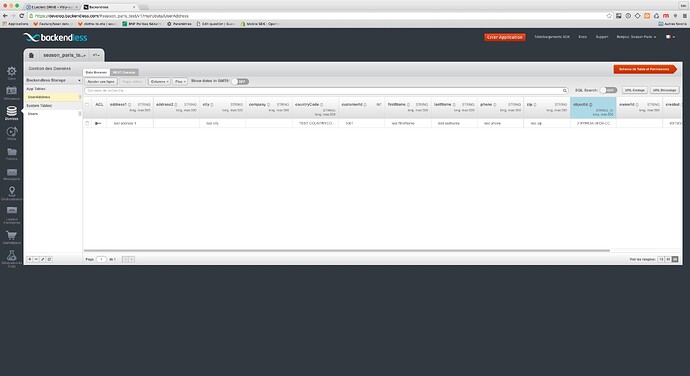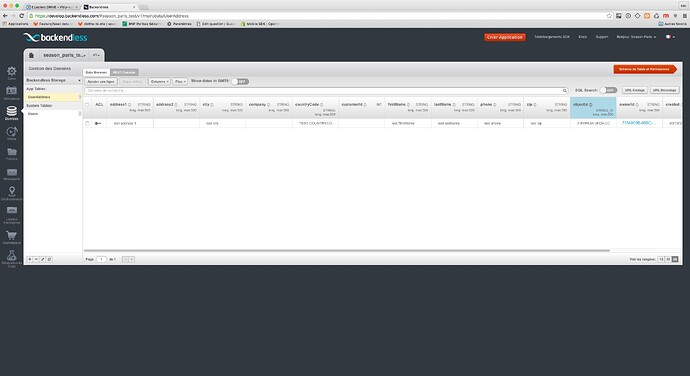Hello,
Using the iOS SDK (from github, cloned less than a week ago)
with appID AEE7E37E-51C0-8032-FF1F-11FD36B99D00,
I have a single class “UserAddress”. I want to use its field “ownerId” as the relation with the User object.
I have a unitary test file in my XCode project to test :
- register a user
- login the user
- save a UserAddress object
=> I see the value of the ownerId field (first screenshot)
- I update the UserAddress object (setting the value of the INT customerId field)
- save the UserAddress object again
=> I see the value of the updated customerId field, but the ownerIf field has disappeared (second screenshot)
Is there an logical explanation to that issue ?
-
I isolated the unitary test in a minimalist project, without any additional code, that may allow you to reproduce the problem. I’m going to send a link to download this minimalist project to support@backendless.com.
- Open the project
- open the BackendlessTest.m
- run the test with CMD+U
- use the breakpoints to check the value of ownerId in the UserAddress table, from the dashboard
-
I’ve noticed another small problem, one I can live with:
in the UserAddress table, I have a column STRING countryCode.
When I save the object, the text for this field is automatically converted to uppercase string.
loïc b.
Hi loïc,
The problem with ownerId lays in your WRONG scenario of data processing:
- you save an original object, then set its ‘objectId’ from the saved object in the server response.
- you change the property of the original object, then update it on the server.
The main rule is “don’t change objectId manually”.
The RIGTH scenario is:
- you save the original object, get the saved object from the server response - and now it is the actual object you’ll operate with.
- you change the property of the saved object, then update it on the server.
Here is a sample demonstrating the right scenario (in swift):
func updateSavedObject() {
let phoneBook = PhoneBook()
let contact = Contact()
phoneBook.contacts = [contact]
phoneBook.status = 0
var error: Fault?
let created = Backendless.sharedInstance().data.save(phoneBook, error: &error) as? PhoneBook
if error == nil {
print("PhoneBook has been saved: \(created!.objectId)")
// - RIGHT
created!.status = 50
var error: Fault?
let updated = backendless.data.update(created, error: &error) as? PhoneBook
if error == nil {
print("PhoneBook has been updated: \(updated!.objectId)")
}
else {
print("Server reported an error: \(error)")
}
//
/* - WRONG
phoneBook.objectId = created?.objectId
phoneBook.status = 50
var error: Fault?
let updated = backendless.data.update(phoneBook, error: &error) as? PhoneBook
if error == nil {
print("PhoneBook has been updated: \(updated!.objectId)")
}
else {
print("Server reported an error: \(error)")
}
*/
}
else {
print("Server reported an error: \(error)")
}
}
Regards,
Slava

